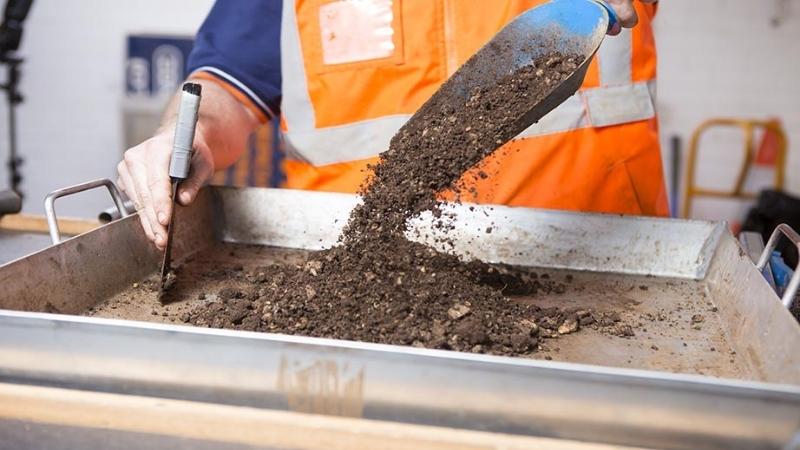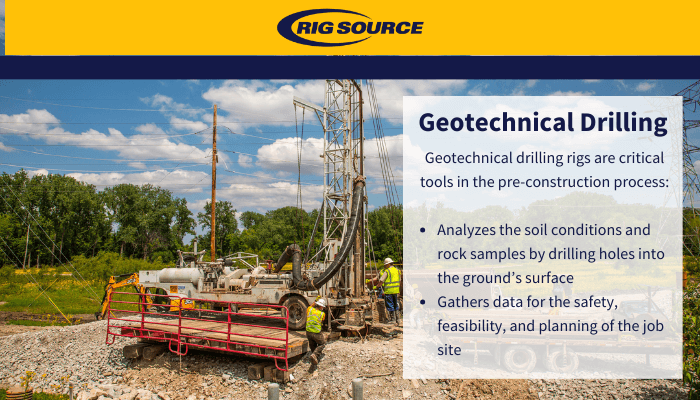Understanding the Principles: Regarding Geotechnical Engineering in Modern Construction
Understanding the Principles: Regarding Geotechnical Engineering in Modern Construction
Blog Article
The Significance of Geotechnical Design in Resolving Ecological Challenges and Enhancing Building Security
Geotechnical design offers as a foundation in the crossway of ecological stewardship and building and construction safety, giving important insights into the habits of dirt and rock under numerous problems. By applying critical site investigations and customized reduction actions, geotechnical designers play an essential duty in guarding both human lives and eco-friendly honesty.

Role of Geotechnical Design
Geotechnical engineering plays an important function in the style and building and construction of framework by dealing with the behavior of soil and rock products under different conditions. This field of design is necessary for understanding the communication between structures and the ground, which includes identifying the load-bearing ability of dirt, assessing security, and anticipating possible settlement or failure.
Geotechnical designers are responsible for carrying out website investigations, which entail sampling and testing soil and rock to gather data on their physical and chemical residential properties. This information is vital for making foundations, retaining wall surfaces, and other earth-retaining structures that make certain safety and longevity. Furthermore, geotechnical design educates the selection of ideal building and construction techniques and products, thus decreasing risks related to soil behavior.
In addition, the assimilation of geotechnical engineering principles into urban planning and environmental administration is critical for attending to obstacles such as ground contamination and groundwater management. By comprehending geotechnical elements, engineers can create sustainable remedies that improve the resilience of framework versus all-natural dangers, while likewise promoting environmental stewardship. Ultimately, the duty of geotechnical engineering is indispensable for attaining safe, durable, and eco mindful building and construction practices.
Soil Erosion Reduction
Soil erosion presents a considerable risk to both ecological stability and infrastructure stability, impacting roughly 24 billion heaps of productive dirt shed annually worldwide. This sensation is aggravated by variables such as logging, urbanization, and poor farming methods. Geotechnical engineering plays a crucial function in establishing efficient soil disintegration mitigation strategies that safeguard both the setting and building and construction projects.
One approach involves the application of erosion control techniques such as plant life growing, which maintains dirt with origin systems. Additionally, the building and construction of keeping balconies and wall surfaces can effectively reduce surface drainage and protect at risk areas from disintegration. Appropriate water drainage style is additionally crucial; it reduces water buildup and directs excess drainage far from important structures.
Moreover, geotechnical engineers use soil stabilization strategies, such as the application of geotextiles and eco-friendly mats, to improve soil cohesion and stop degradation - geotechnical engineer description. Regular surveillance and assessment of erosion-prone sites allow prompt treatments, guaranteeing long-lasting sustainability. By incorporating these strategies, geotechnical engineering not only alleviates the influences of dirt disintegration but likewise adds to the strength of infrastructure versus environmental difficulties, ultimately fostering a much safer and more lasting constructed setting
Groundwater Defense Approaches
Groundwater offers as a crucial source for alcohol consumption water, agriculture, and industrial processes, making its defense necessary for environmental sustainability and public more tips here wellness. Efficient groundwater protection techniques are crucial in reducing contamination dangers and ensuring the long life of this source.

Routine monitoring of groundwater high quality is likewise important, allowing very early discovery of contamination sources and helping with timely removal efforts. Utilizing innovative innovations, such as geophysical studies and remote picking up, help in identifying possible hazards to groundwater books.
In addition, public education and stakeholder engagement are crucial, promoting neighborhood assistance for groundwater security initiatives. about geotechnical engineering. By incorporating governing steps, technical innovations, and neighborhood involvement, we can create an extensive structure that safeguards groundwater resources while promoting lasting advancement and construction practices
Landslide Risk Administration
Landslides present significant threats to both human safety and facilities, making effective threat administration strategies crucial. Geotechnical engineering plays an important duty in recognizing, assessing, and mitigating landslide dangers. A comprehensive understanding of incline security, dirt mechanics, and hydrology is crucial for establishing effective threat monitoring strategies.
The primary step in landslide risk administration includes thorough website investigations, that include geological mapping and soil screening. These examinations help designers evaluate the possibility for landslides by determining crucial aspects such as incline angles, dirt structure, and water content. Utilizing advanced innovations such as remote picking up official site and geophysical studies can boost the accuracy of these evaluations.
As soon as dangers are determined, proper mitigation measures can be applied. These may consist of design options such as preserving walls, drainage systems, and incline stabilization techniques. Furthermore, monitoring systems ought to be developed to identify indicators of ground activity and modifications in water levels, permitting for positive treatments.

Enhancing Building Safety And Security
Building sites often provide a myriad of threats that can endanger employee safety and security and job integrity. Geotechnical engineering plays a critical function in enhancing building and construction safety by giving necessary understandings into subsurface problems. Via thorough soil and rock evaluation, geotechnical engineers can determine potential dangers, such as dirt instability, groundwater problems, and seismic vulnerabilities, which might endanger the safety of construction tasks.
Carrying out geotechnical remedies, such as proper structure style and the usage of retaining frameworks, reduces these dangers significantly. These services not just guarantee the stability of the structures being constructed however also produce a more secure working setting for building personnel.
Additionally, fostering a culture of security through training and adherence to developed safety and security methods additionally boosts construction site safety. By incorporating geotechnical experience into the planning and implementation stages, building and construction tasks can attain greater safety and security standards, ultimately shielding employees and guaranteeing effective project completion.
Verdict
In verdict, geotechnical engineering offers as a crucial discipline in tackling environmental obstacles and advertising building and construction safety and security. Through efficient dirt disintegration reduction, groundwater defense approaches, and landslide threat administration, geotechnical engineers add to the growth of resistant infrastructure.
Geotechnical engineering offers as a keystone in the junction of ecological stewardship and building security, offering essential insights into the habits of soil and rock under various conditions. Geotechnical design notifies the option of proper construction approaches and products, therefore decreasing risks linked with soil habits.
Geotechnical engineering plays a crucial function in creating reliable soil disintegration reduction approaches that protect both the environment and building and construction tasks.
Moreover, geotechnical engineers utilize soil stablizing methods, such as the application of geotextiles and naturally degradable mats, to boost soil communication and stop destruction. Through detailed soil and rock evaluation, geotechnical engineers can identify potential threats, such as soil instability, groundwater concerns, and seismic susceptabilities, which may compromise the security of building and construction tasks.
Report this page